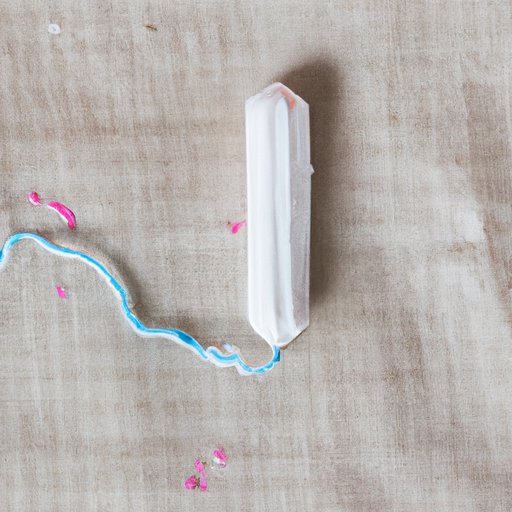Introduction
When it comes to menstruation, it’s important to think not only about personal hygiene but also about environmental and plumbing issues. One of the most common questions is, “can you flush a tampon?” The short answer is no, but there are many myths and misconceptions about proper tampon disposal. This article will explore the dangers of flushing a tampon, alternative methods for disposal, and more sustainable menstrual products.
Flushing a Tampon: The Dangers You Need to Know About
It may seem like the easiest and most convenient option, but flushing a tampon can have serious consequences. Tampons are designed to absorb fluids, which means that once they’re flushed, they don’t break down as easily as toilet paper. This can cause clogs in pipes, leading to sewage backups and overflows. Flushing tampons can also harm wastewater treatment facilities, potentially contaminating local water systems and harming marine life.
Instead, tampons should be placed in a designated menstrual waste bin. These can be found in most public restrooms, or you can purchase your own. Alternatively, wrapping the tampon in toilet paper and throwing it in the regular trash is another safe option.
Tampon Flushing Myths Busted: What You Need to Know
There are many misconceptions surrounding the flushing of tampons. One myth is that tampons are biodegradable and won’t harm the environment. In reality, tampons can take years to break down, contributing to excess waste in landfills or sewer systems. Another myth is that flushing tampons is hygienic, when in fact it can spread bacteria and cause unpleasant odors.
Proper tampon disposal is actually quite simple. Tampons should be wrapped in toilet paper and placed in a designated waste bin. Spread the word about responsible menstrual waste management by talking to your friends and family about the negative impacts of flushing tampons.
The Impact of Flushing Tampons on Your Plumbing
Aside from the environmental harm caused by flushing tampons, there are also potential costs associated with plumbing damage. Clogged pipes and blocked sewer lines can lead to expensive repairs, particularly for homeowners or renters who are responsible for maintenance. By practicing responsible tampon disposal, you can prevent plumbing issues and save yourself money in the long run.
Tampon Alternatives: Safer and More Sustainable Options
For those looking for a more sustainable and eco-friendly alternative to tampons, there are many options available. Menstrual cups, reusable cloth pads, and period underwear are all innovative alternatives to traditional menstrual products. Menstrual cups are particularly popular, as they are cost-effective and can last for several years. Cloth pads and period underwear are also reusable, reducing waste and saving money in the long run.
By exploring these alternatives, we can promote a wider conversation about reducing waste and making sustainable choices. Although it may take some time to adjust to a new menstrual product, the benefits for both the environment and your wallet are worth it.
The Taboo of Menstrual Waste: Why We Need to Break the Silence
The conversation around menstrual waste can be uncomfortable, but it’s crucial to break the silence in order to promote responsible disposal and reduce the stigma surrounding menstruation. Lack of education and information about proper tampon disposal can contribute to plumbing issues and harm both the environment and public health. By normalizing conversations about menstrual waste, we can create a safer and more sustainable future for everyone.
Conclusion
In conclusion, flushing a tampon is not only harmful to the environment, but also to plumbing systems and public health. By practicing responsible disposal methods such as placing tampons in designated menstrual waste bins or wrapping them in toilet paper and throwing them in the trash, we can avoid costly repairs and reduce our impact on the environment. Exploring eco-friendly alternatives to tampons also has numerous benefits for both our health and the planet. Let’s break the silence on menstrual waste and make sustainable, responsible choices moving forward.
